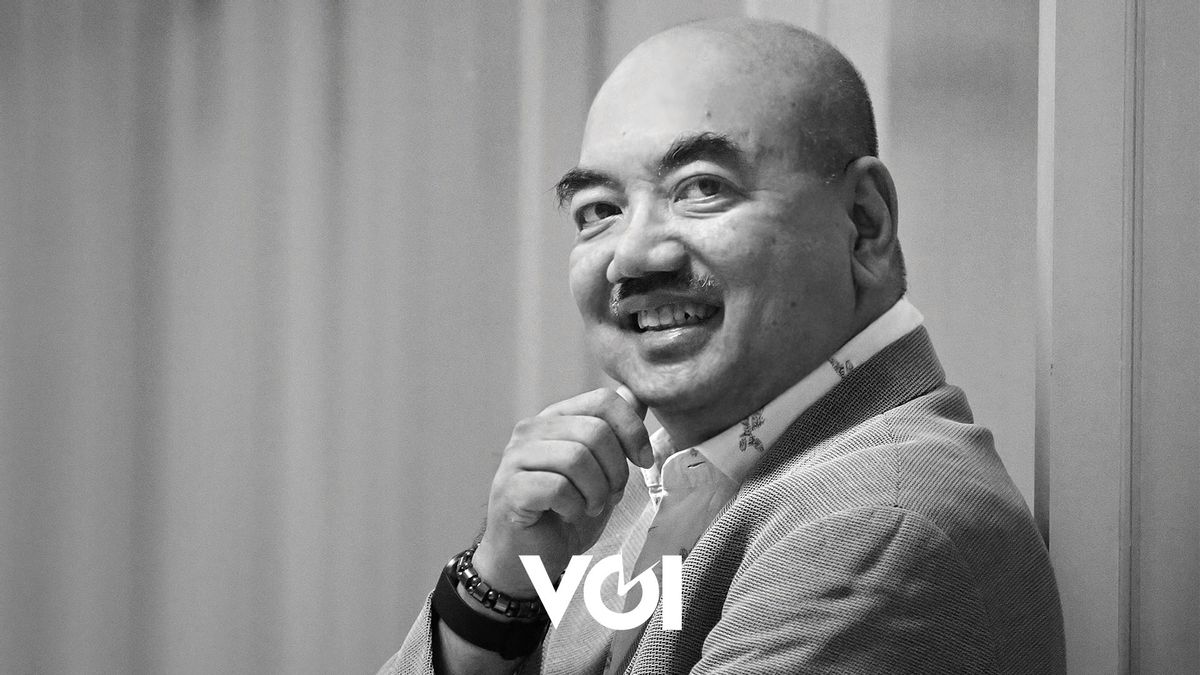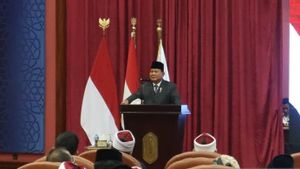Direct cash assistance (BLT) for cooking oil was immediately rolled out by the government for the poor after the turmoil in cooking oil prices before the HET (highest retail price) was revoked and migration prices were released according to market mechanisms. According to Yudianto Tri, General Chairperson of INKOPPAS (Induk Pasar Merchant Cooperative), cooking oil BLT is only a temporary solution, what the community needs is a permanent solution.
***
The price of cooking oil has started to creep up since November 2021. Packaged migraines have soared to 24,000 per liter. Seeing this situation, the government intervened by imposing a HET of 14,000 per liter. Although prices can be controlled, the supply of migrants in the market is starting to become scarce.
According to Yudianto Tri, this situation is strange, because Indonesia is the largest CPO producing country in the world. "From the inspection carried out by the authorities, there are no problems in the upstream sector. There are also no problems in factories because everything produced is absorbed by distributors. The problem is in the distributor. And there is hoarding. This hoarding is what makes cooking oil scarce,” he said.
It is suspected that one of the reasons for this price increase is because the high disparity in CPO prices between domestic and overseas makes CPO producers prefer to export because the profits are much greater. CPO in addition to the needs of making migrants is also a raw material for biodiesel.
During the 1998 monetary crisis, cooking oil prices also soared. At that time the government involved INKOPPAS to stabilize prices. At that time, the HET for cooking oil should have been 4,200 per liter, traders bought Rp. 3,600 from distributors. “But what happened was that the price skyrocketed to Rp. 8,000 to Rp. 8,500. At that time, the government entrusted INKOPPAS to help distribute cooking oil prices. And thank God the price can go down to Rp. 4,000. The method is directly distributed to traders in the market," he said.
This is what underlies INKOPPAS to apply to become a distributor of migrants. According to Yudianto Tri, the traffic jams in the distribution of migrants can actually be traced. However, the authorities seem reluctant to resolve this issue. There are only promises to solve the problem but in reality there is nothing. The government revoked the HET and the price was left to the market mechanism. Various parties consider this is the government's defeat in dealing with migrant cartels in this country.
Then BLT and subsidies were issued as a way to quell public anger. What the government did by providing BLT for migrant workers of Rp. 100,000 for three months which was paid in advance in Yudianto's view was a temporary solution, not a permanent solution. "So the solution from upstream to downstream is tidying up everything," he stressed to Iqbal Irsyad, Edy Suherli, Safic Rabos and Rifai from VOI who met him at the INKOPPAS office recently. Here's the excerpt.

Indonesia is the largest producer of CPO (Crude Palm Oil) in the world, but cooking oil is scarce and the price is high, how do you see this phenomenon?
That's the oddity that happened in our country. Indonesia is the world's largest producer of palm oil. Uniquely, our country is experiencing a shortage of cooking oil. In the cooking oil industry, there are positions upstream, in this case palm oil plantations. Below it is a palm oil processing factory. Next there are distributors, then there are market traders (retail/modern and traditional markets) who directly deal with buyers or consumers.
From the inspection carried out by the authorities, there are no problems in the upstream sector. There are also no problems in factories because everything produced is absorbed by distributors. The problem is in the distributor. And there is hoarding. This hoarding is what makes cooking oil scarce.
Where is INKOPPAS' position in this matter?
INKOPPAS has 18 PUSKOPPAS and 2,689 KOPPAS (market cooperatives) spread throughout Indonesia. We have proposed to several relevant Ministries that INKOPPAS can become a distributor of cooking oil. Hopefully in the near future we will get that trust. If we become a distributor, we will not stockpile, it will be distributed directly to the existing KOPPAS.
The role of INKOPPAS is to protect and prosper the existing KOPPAS, because we are a place where market swords come together to do business together in a cooperative forum.
Is there information about the availability of cooking oil from the distributor level?
From the distributor's point of view, there is no problem, the number of distributors will continue to grow even more, but the problem is that all incoming goods (migration) do not enter the merchants smoothly. We take the example of hoarding, the government admits that it exists. If there is hoarding, why is it not caught and the mingor is distributed to the public. Another case of hoarding of 1.1 million tons of migrants that occurred in Deli Serdang, North Sumatra, why is that not said to be hoarding? The KPPU (Business Competition Supervisory Commission) and the National Police Criminal Investigation Unit were already there. They said there was no hoarding, meaning that there was no evidence of hoarding. It's weird.
Pak Lutfi (Minister of Trade) stated that there were illegal exports of 415 million tons of CPO. But until now we don't know who is exporting it and what action is taken by the authorities, it's not clear. There are promises that within 3 or 4 days there will be a suspect. But so far there is no such thing. This is the odd thing that happened. The public is only entertained with promises but no action. For what it all, what is needed is a solution.
The next thing that happened was that the HET for packaged cooking oil was revoked, the question of price was left to the market mechanism. Then the price of bulk cooking oil also rose. What happens is that the price of migration is out of control. If so, which side is the government on? People or large migration industry. This kind of thing shouldn't have happened, we have to fix all of this.

What do you think about housewives who were said to have migraines at home?
If it is said that housewives hoard cooking oil, it hurts all of us. There are no housewives and people who hoard cooking oil. What they are worried about next week is whether they can still fry. Then, can the fried food vendors on the side of the road still be able to sell them next week? That's the concern.
The government provides a solution for issuing BLT cooking oil of IDR 100,000 per month for three months which is paid in advance, what is your opinion?
I see BLT is just entertainment, it's only a temporary solution, not a permanent solution. The goal is that people do not demo. No one can guarantee that the money for the BLT migrants will be used to buy cooking oil. This shouldn't be necessary.
There is information in the field that bulk cooking oil is packaged and sold in the market, what about this?
Bulk cooking oil is subsidized, it cannot be supplied for packaged cooking oil. It should not be packaged, because it turns out to be packaged cooking oil with a high price. What the government provides through bulk cooking oil subsidies must reach the people. Not getting into big industries, big restaurants, etc. The bulk migration is only for the community, housewives, MSME actors. Some have already been arrested for abuse of bulk migraine, etc. It would be great if this could be tidied up.
What is the solution from INKOPPAS to increase the price of this migraine?
Indeed, there is a very high disparity between domestic CPO prices and overseas prices. From the business side, of course, they prefer to export rather than fulfill the domestic market. There is a domestic market obligation (DMO) and domestic price obligation (DPO) policy which will be increased by 20 percent. But this doesn't help either.
Then there is an export tax for CPO, from this export tax it is channeled to provide subsidies. If cooking oil manufacturers produce biodiesel they will get subsidies. What happened was that the CPO producer gave a small export tax but received a very large subsidy. Someone pays 1 million dollars in export tax and gets a 4 million dollar subsidy. So lucky them. This must receive attention so that this issue is fair for all.
If so, is it possible to divert more CPO for biodiesel production because it will be more profitable for entrepreneurs, low production costs and higher profits?
The possibility is always there, so there are indeed a lot of CPO derivatives. It could be cooking oil, bio diesel and others. Even dirty oil (miko) alone has a high economic value, the price is very good.
What do you think is the long term or permanent solution to this migraine problem?
Must be seen again from upstream to downstream. There are no problems with palm oil production and palm oil mills. In terms of production enough. What happened yesterday was a problem with distributors and there was a migration that was exported illegally. Therefore, INKOPPAS asked to be made a distributor to distribute it to existing networks in the market. So the solution from upstream to downstream is all tidied up.
When the HET is set by the government for rare migration, when the price is released to the market, migrants appear but with prices soaring, is the distribution good?
That's what happened, when there was a rare migraine HET, when it was released to the market price, migraine immediately appeared in modern retail outlets. The Ministry of Trade and the Police should be able to trace this from which warehouse. And who the distributor is, it's that simple to track him down. But so far no firm action has been taken. If the problem is hidden, we will not solve the problem at hand.
Our security forces are still lacking then?
I'm not saying less, but better to improve. The government, law enforcement together see this as a problem that needs to be solved. Not to be covered. We are ready to help the Ministry to provide a solution for cooking oil that is happening now.
What cases of rare migraine have happened before?
A case like this happened in 1998 during the monetary crisis. The retail price of cooking oil should be 4,200 per liter, traders bought it at a price of Rp. 3,600, then it was sold for Rp. 4200, but what happened the price skyrocketed to Rp. 8,000 to Rp. 8,500. At that time, the government entrusted INKOPPAS to help distribute migrants. And thank God the price can go down to Rp. 4,000. The method is directly distributed to traders in the market.
So far, INKOPPAS has not been involved in distribution, it has involved modern retail associations. What happened, a lot of deviation. As soon as we speak out loud it just changes. People also have to follow certain conditions to be able to migrate. Due to modern retail, mothers rarely go to traditional markets.
The pandemic has affected modern retail, are traders in traditional markets also affected?
When COVID-19 is at its peak, the turnover of market traders has decreased drastically. Traditional markets were once used as a scapegoat as a place of transmission of COVID-19. I do not accept this accusation. Maybe there are traders who are determined to sell even though they are exposed. People like this are just sanctioned, without having to close the market. Our obligation is how to help KOPPAS members to be independent.
Have any merchants gone bankrupt in the pandemic?
If it goes bankrupt, yes, but indeed many are affected. Turnover decreased drastically 10 to 20 percent. But now the situation has sloping, the traders have also returned to increase their turnover.
What is INKOPPAS doing to help members affected by the pandemic? There is a market digitization program launched by Menparekraf Sandiaga Uno in August 2021. We are currently compiling a road map for market digitization. We unite all KOPPAS members in order to obtain the facilities needed, such as loans, information on supply of goods, etc. Hopefully within a year this program can be launched. In provinces that have PUPKOPPAS, we go through them, but if they don't, we go directly to KOPPAS.
We hope that after this Eid, INKOPPAS can be appointed as a distributor of migrants. After that we will become distributors of meat, and other commodities that are the domain of market traders.
When the price of goods soars, what can be done, especially before Eid?
If the price of goods in the market we can not control. The important thing is the smooth supply of goods. And we have given input to the government to maintain the supply of basic goods ahead of Eid. The clichéd answer from the government is usually something like "Don't worry, the stock will be sufficient,". The need for basic goods is sufficient but the price has soared. What the community does is not only sufficient stock but also the price is affordable.
Recently the government also raised VAT from 10 percent to 11 percent, does this affect the sales of traders in the market?
The government increased VAT to 11 percent to meet the needs of the state. In addition, Pertamax also went up. If it is like this will affect inflation. In the past, Rp. 100,000 could serve a few days, but now it's only for a few hours. But that's the domain of our government can't act. We hope that the business at market traders can run, if it can grow.
Even though he's busy, Yudianto Tri still prioritizes sports

In the midst of his busy schedule of doing business, organizing, being the Chairman of INKOPPAS (Induk Pasar Merchant Cooperative) as well as traveling and hunting for culinary delights, Yudianto Tri does not leave sports activities. For him, sport is not only healthy for the body, but also a balance for his hobby of culinary hunting.
When the case of the COVID-19 pandemic was at its highest some time ago, he used his time to exercise a lot. “During the pandemic, I mostly worked from home (WFH). In addition to online meetings with staff and relations, I fill my activities with sports," he said.
Yudianto, who is also the Deputy Chairman of the Advisory Board of the Jakarta Chamber of Commerce and Industry, exercises at his home in the Ciganjur area of South Jakarta. What sport does he do? "My hobby is swimming, so what else can I do with swimming in the pool at home. As a variation, I run on a treadmill,” he said.
If he is tired of swimming and running on a treadmill, he uses his stationary bicycle. "Static bikes are also good for sweating," he said. But he has another trick to sweat even though he doesn't move much. You do this by entering the sauna room in his house. Just silent sweat already dripping because of the hot temperature. “After that, it was closed by soaking in the Jakuzi pool. Everything is done at home," he continued.
How long are swimming, stationary cycling and running? "It doesn't take long if you swim about 20 laps. For stationary bikes and treadmills each one does about 30 minutes. That's enough and I'm already sweating," he said.
Yudianto admitted that there were many benefits that he could get from his regular exercise. “It is undeniable that regular exercise has many benefits for the health and elasticity of my body. That's why even though I'm busy I make time to keep exercising. Because it feels very beneficial if we exercise regularly, "he said. "Physically so fit and eager to carry out activities," he continued.
He usually works out at least three times a week. If there is an opportunity, you can increase the portion of the sport. “The important thing is that we have to exercise regularly. The matter of duration is relative, yes. Depends on the situation and conditions. Usually, I exercise three times a week, if I have free time, I usually add more,” said Yudianto who is also the CEO at PT. Paragon Pacifica and PT. Begawan Maharishi and PT. Property Star Paragon.
Pandemic

The pandemic has limited space for movement. The activity of traveling cannot be done at all. Because many countries, including Indonesia, restrict their population from traveling abroad with various strict requirements. On the other hand, foreigners who usually come to do business and tourism activities are also not able to come to Indonesia.
He is grateful that the pandemic situation is getting more conducive day by day. Although the pandemic has not been said to be over or the status has not changed from pandemic to endemic, activity has started to increase. "His condition is getting better now. Traveling to other cities in Indonesia and also abroad has become easier because the requirements that have so far been decreasing are decreasing. PCR and antigen are deprecated. The important thing is already a booster vaccine. Quarantine has been reduced or even abolished. We should be grateful for all of this," he said.
Usually Yudianto regularly visits Europe, twice a year. The problem is that there is a child who is studying in a European country. “Besides visiting my son who is studying there, I also use it for traveling. During the pandemic I can't go there. In the near future, I will go to Europe,” continued Yudianto Tri.
For him, apart from traveling, the opportunity to visit other countries is also used to see the development of existing technology. "We can see what the technological developments are like there. It can be an inspiration and can be applied to my business in Indonesia,” said Yudianto, who often visits bookstores and buys new books when he is abroad.
Culinary

Yudianto is not complete when traveling without tasting the culinary riches of the places he visited. “One of my hobbies is eating, so when I go abroad or to cities in the country, I don't forget to enjoy the local specialties. There seems to be something missing if it's not culinary tourism," he said. However, during the COVID-19 pandemic, routine tourist activities cannot be carried out.
In this culinary activity, Yudianto does not sometimes fill his stomach. But there is art contained in it. “I am one of those who really like Betawi goat soup. Before eating, we are usually invited to choose which part to eat. There is a head, brain, viscera, legs and other parts. For me it is an art in itself,” he said.
Besides goat soup, Yudianto also likes seafood. Even for seafood he often cultivates or cooks himself. “After buying fish and various seafood at the Muara Baru fish market, I cook it myself at home with my wife. Cooking food is also an art. But I can only cook on weekends or holidays. Outside of that, where is the time," he continued.
Still eating food from goats and seafood, are you not worried? “Until now I have had no problems with foods such as goat and seafood. The key is not to overdo it, just enough. If you feel you have had enough and are full, then stop. Don't indulge your appetite, you have to eat more and more," he said.
It turns out that the habit of exercising also helps balance his penchant for culinary tourism. “There is a strong correlation between eating and exercising. Sport is the balance. So the calories that enter the body are burned through exercise. And other balancers are vegetables and fruits,” said Yudianto Tri.
“I see that BLT is just entertainment, it's only a temporary solution, not a permanent solution. The goal is that people do not demo. No one can guarantee that the money for the BLT migrants will be used to buy cooking oil. This shouldn't be necessary."
Yudianto Tri
The English, Chinese, Japanese, Arabic, and French versions are automatically generated by the AI. So there may still be inaccuracies in translating, please always see Indonesian as our main language. (system supported by DigitalSiber.id)












